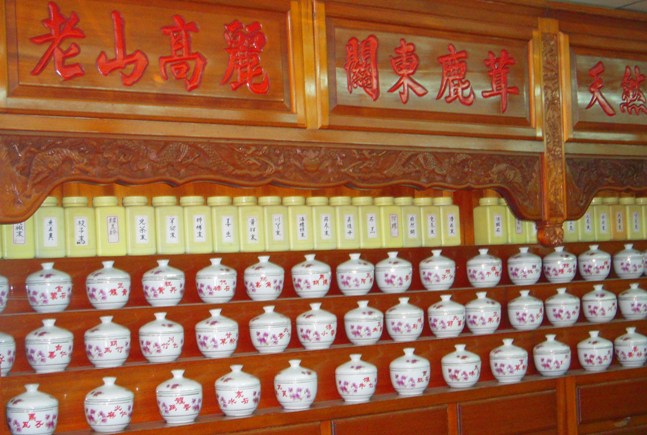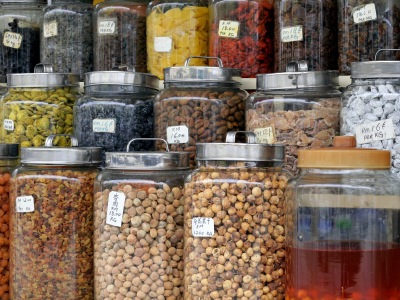Herbal remedies used in Chinese Medicine today are based on the work of a number of accomplished physicians and scholars. Approximately 1,700 years ago, these scientists brought a sophisticated understanding of both the natural world and human interactions with nature to the practice of healing through herbs. What is commonly referred to today as “Chinese Herbal Medicine” is a complex and highly effective form of treatment methods utilizing herbs, minerals, and animal extracts to enhance the body’s ability to achieve a state of health and wellness.
One of the most important distinctions between Chinese Herbal Medicine and herbal medicine here in the West is the sophisticated practice of combining individual herbs. Essentially a group of herbs is combined so that the medicinals work together resulting in the herbal combination or formula having a greater effect than if those herbs had been used alone. Western herbal medicine uses individual herbs such as Echinacea and St. John’s Wort in order to provide a very specific effect. The synergistic effect of using many herbs in combination has a much greater effect that not only addresses the patient’s symptoms but also can nourish and enhance their energy and vitality. The effective practice of combining herbal medicines has evolved into a very sophisticated practice and is considered the most advanced form of Traditional Oriental Medicine.
The use of herbal remedies in the Orient is so sophisticated that a ten volume Chinese Materia Medica published in 2002 identified 9,000 different substances that have been used as medicinals throughout history. In practice only about 500 of these are used today, but they are combined in thousands of different formulations to treat a wide range of illnesses. Most of these are plant-based substances and a much smaller number are minerals. Animal extracts are rarely, if ever, used any more outside of China due to ethical concerns and endangered species protection.
Another important aspect of Chinese Herbal Medicine is the construction of herbal formulas specific to a patient’s complex set of symptoms. Herbal formulas are chosen based on the patient’s symptoms, not because of a disease diagnosis, which is usually opposite of the approach taken in the West. In addition, each formula can be customized specifically for a patient addressing his or her unique needs. For example, a patient with migraines would be given an herbal formula to address their chronic headaches, but this formula could also be modified or combined with another herbal formula to address that patient’s fatigue, insomnia and irritable bowel syndrome. A more modern biomedical (i.e., Western) approach would usually be a prescription for medications that will offer symptomatic pain relief, but not in any way address the patient’s other symptoms that may be contributing to their headaches. In this way, Chinese Herbal Medicine is a very customized and unique form of therapy that not only addresses the patient’s symptoms but also addresses the underlying causes that have allowed those symptoms to manifest.
Many of the herbs used in Chinese Herbal Medicine have also been used for centuries as common kitchen ingredients in Asia. Herbs are such an important way to stay healthy that one can find many herbal substances used in everyday dishes such as chicken soup, beef stew, or even vegetable dishes. This practice is commonly referred to as “kitchen medicine” and enables Asian families to use herbs as a preventative measure so that they can stay healthy and live a long, high-quality life.
The use of topical ointments or plasters to treat acute pain such as sprains or strains, as well as chronic pain conditions, is still another aspect of herbal remedies found in the Orient. Many of these formulas used to treat pain were developed by many of the great martial arts schools in Asia as a way to treat their students injured during training. Such topical treatments can effectively alleviate pain and reduce swelling, thereby improving function and increasing range of motion.
Chinese Herbal Medicine is an essential part of any treatment plan and should be considered for both acute and chronic illnesses. Chinese herbs are traditionally dispensed in their raw or unadulterated form, boiled in water, and made into a medicinal tea that is drunk 2-3 times per day. However, modern day forms of Chinese herbs such as capsules, tablets, granules, ointments, and topical plasters are more commonly used today in order to increase patient compliance and ease of use.
Now, there is no need to visit China. Located in Charlotte, NC, Abounding Qi offers an array of treatments in Chinese Medicine. Using only the highest quality herbs available to create a customized formula to address your current health concerns and medical history, we will work with you to determine the best type of herbal formulations for you based on your condition and lifestyle.



